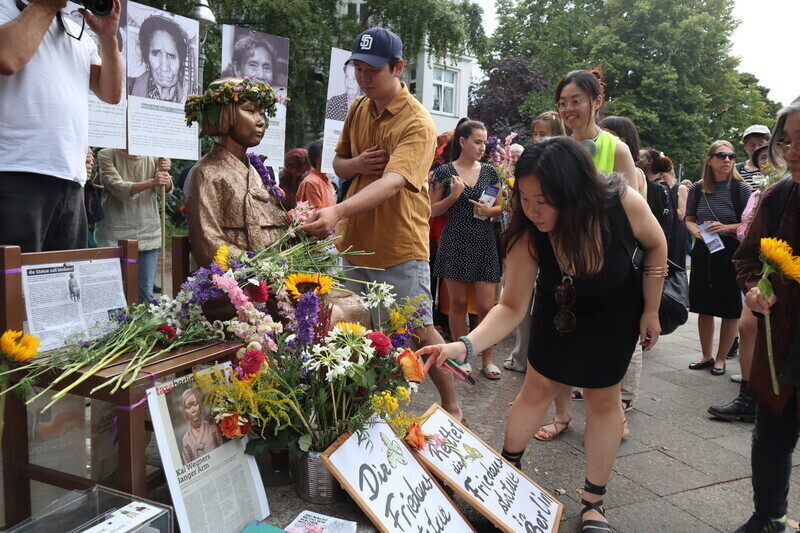
To mark International Memorial Day for ‘Comfort Women’ on Aug. 14, 2024, participants at a rally held at the Statue of Peace in Berlin’s Mitte borough lay flowers before the memorial honoring victims of wartime sexual violence. (Jang Ye-ji/Hankyoreh)
The UN Committee on the Elimination of Discrimination against Women (CEDAW) issued another call for the Japanese government to increase its efforts to uphold the rights of survivors of wartime military sexual slavery, including the acceptance of requests for compensation.
In its observations, it stressed the need for the Japanese government to exclude war crimes and crimes against humanity from periods of limitation and to approach the matter of reparations from a victim-centered perspective.
On Tuesday, CEDAW published a document entitled “Concluding observations on the ninth periodic report of Japan,” concerning the Japanese government’s implementation of the UN Convention on the Elimination of All Forms of Discrimination Against Women.
The report stated that while the committee “commends the efforts of the State party [Japan] with regard to addressing the rights of ‘comfort women,’” those efforts also “need to be sustained and expanded to ensure the rights of victims/survivors to truth, justice and reparations.”
The committee referred repeatedly to past recommendations issued to the Japanese government.
“The Committee draws the attention of the State party to the fact that ECOSOC adopted Resolution 1158 (XLI) confirms that, in international law, ‘the principle that there is no period of limitation for war crimes and crimes against humanity’ must be accepted,” the report said. ECOSOC refers to the UN Economic and Social Council.
In a previous progress report on the Japanese government in March 2016, CEDAW strongly criticized the inadequacy of restitution measures for victims of sexual slavery by the Japanese military during World War II.
At the time, the CEDAW presented a final opinion calling the military sexual slavery issue “unresolved” by an intergovernmental agreement between South Korea and Japan on Dec. 28, 2015.
It also commented that Japanese government leaders and public officials had been “making disparaging statements regarding responsibility, which have the effect of retraumatizing victims.” Remarking on the approach of treating the comfort women issue as “resolved finally and irreversibly,” it said that the government “did not fully adopt a victim-centred approach.”
The reference to the matter being “resolved finally and irreversibly” was a criticism of the improper nature of the intergovernmental agreement reached a year earlier in 2015.
In its latest report, CEDAW stressed that issues remained eight years after its previous recommendations.
The committee regularly reviews and reports on major countries’ corrective actions in connection with the UN Convention on the Elimination of All Forms of Discrimination Against Women. Its conclusions are not legally binding.
Another recommendation made by CEDAW for the adoption of a system in Japan that would not require women to adopt their husband’s surname. In Japan, the current system is one in which women generally take their husband’s surname after marriage. This has sparked controversy over what many view as sexism, along with calls for improvements to address the harm that is caused to women in social terms.
The committee’s recommendation in this year’s report for the Japanese government to adopt a system allowing spouses to use different surnames came after it had previously made the same recommendation in 2003, 2009 and 2016. In its last review, it commented that the system compelling the adoption of a husband’s surname after marriage was negatively impacting Japanese women in both their professional and personal lives.
At the review, the Japanese government delegation avoided giving a direct answer, commenting that the current surname system was an issue where opinions among the Japanese public were divided and stating that as an important matter relating to the “family’s way of existing” for society at a whole, it necessitated “obtaining broad understanding by the public.”
CEDAW additionally commented on the provisions in Japan’s Imperial House Law dictating the succession to the throne as passing solely to male offspring in the male line, calling it “contrary to the object and purpose of the [UN] Convention.”
While the report stressed that the committee “takes note of the State party’s position that the provisions of the Japanese Imperial House Law are not within the purview of the Committee’s Competence,” it also recommended that “the State party look at good practices of other States parties that have reformed their succession laws to ensure equality of women and men.”
During the preceding review, the Japanese government voiced the position that the imperial succession provisions were foundational to the state, asserting that it was inappropriate to mention them in the context of the UN convention.
CEDAW’s final opinion additionally included calls for the Japanese government to recognize same-sex marriage.
While committee reviews are not binding in terms of international law, they are respected by the international community as a way of implementing the principle of abolishing discrimination against women.
By Hong Seock-jae, Tokyo correspondent
Please direct questions or comments to [english@hani.co.kr]


